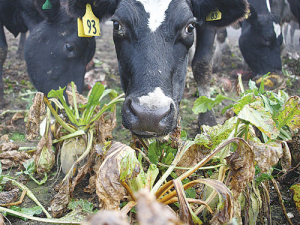A Bugger's Muddle
OPINION: Jacqueline Rowarth opined in Rural News, January 19, "Confusion abounds about agricultural greenhouse gases (GHGs) and misinformation is rife".
 Fodder beet was a standout, although its impact on methane emissions was less dramatic and consistent.
Fodder beet was a standout, although its impact on methane emissions was less dramatic and consistent.
Can changing what New Zealand livestock eat reduce the country’s emissions of methane and nitrous oxide?
Scientists are studying this as part of NZ’s aim to lower its greenhouse gas emissions to internationally agreed targets.
To help people understand the complexities in reducing agricultural greenhouse gas emissions, the farmer-supported Pastoral Greenhouse Gas Research Consortium (PGgRc) and NZ Agricultural Greenhouse Gas Research Centre (NZAGRC) have published fact sheets including one on low greenhouse gas emitting feeds.
Nearly 30 studies measuring methane emissions have been made of 17 different NZ feeds: pasture and various crops including brassicas, chicory, fodder beet, lucerne, maize and clovers.
Only two had noteworthy impacts on methane emissions. Brassica rape was the crop most rigorously tested. Compared to a traditional ryegrass/white clover pasture diet, a 100% brassica rape diet reduced emissions by an average of 30%.
Fodder beet was the other standout, although its impact on methane emissions was less dramatic and consistent. Trial results to date indicate it can reduce methane emissions by about 20%, but only when it makes up at least 70% of the diet.
A potential issue with brassica rape and fodder beet is the amount of nitrous oxide emissions created through urine leaching in NZ’s typically wet winter soil. More work is needed to see whether the decreases in methane emissions from these crops are sufficient to offset increases in nitrous oxide emissions.
Regardless, the research shows that large changes in diet are needed to effect much change in methane emissions from livestock.
The researchers conclude that there are no definitive, easy or dramatic ways to reduce emissions through diet alone.
Visit the PGgRC website to download a pdf of the fact sheet: http://www.pggrc.co.nz/
Legal controls on the movement of fruits and vegetables are now in place in Auckland’s Mt Roskill suburb, says Biosecurity New Zealand Commissioner North Mike Inglis.
Arable growers worried that some weeds in their crops may have developed herbicide resistance can now get the suspected plants tested for free.
Fruit growers and exporters are worried following the discovery of a male Queensland fruit fly in Auckland this week.
Dairy prices have jumped in the overnight Global Dairy Trade (GDT) auction, breaking a five-month negative streak.
Alliance Group chief executive Willie Wiese is leaving the company after three years in the role.
A booklet produced in 2025 by the Rotoiti 15 trust, Department of Conservation and Scion – now part of the Bioeconomy Science Institute – aims to help people identify insect pests and diseases.

OPINION: The release of the Natural Environment Bill and Planning Bill to replace the Resource Management Act is a red-letter day…
OPINION: Federated Farmers has launched a new campaign, swapping ‘The Twelve Days of Christmas’ for ‘The Twelve Pests of Christmas’ to…